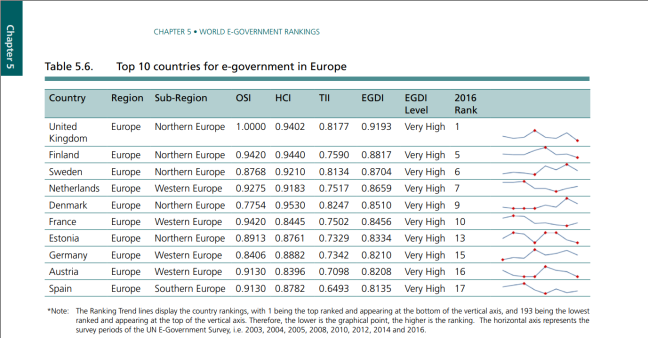The United Kingdom and Finland are Europe’s eGovernment leaders, according to the United Nations Public Administration Network (UNPAN) 2016 UN eGovernment Survey. The list of top 10 eGovernment countries is completed by Sweden, the Netherlands, Denmark, France, Estonia, Germany, Austria, and Spain.
According to a UNPAN press release, some countries, like Denmark and the United Kingdom, are aiming for ‘digital by default’. In these countries, digital services are to become straightforward and convenient, so that all who can use them will prefer to do so, without excluding those who can’t.

From the press release:
The use of digital identity is fast becoming a norm and a must-have feature of any functional eGovernment website in Europe, even though it may still be considered as an advanced innovation in other regions. Digital identity is often linked to a personal identification number and must be recognised as a legal instrument for authenticating users. In France, an innovative approach to policy-making is the use of crowdsourcing in regards to enacting its new digital law. In a bid to tap widespread views and ideas, an open and participatory consultation process attracted over 20,000 people and organisations to go online to vote and comment on the text of the new digital law.
In Estonia, special focus is placed on the ‘once only’ principle in eGovernment and data management, meaning that “the State is not allowed to ask citizens for the same information twice”. This programme is enabled through a decentralised data exchange platform called X-Road that connects all digital governance applications. Legislation and implementation practices, through the Digital Agenda of the European Union, have also contributed to increased interoperability, usability, cost-efficiency and transparency in citizen-state relations.
From the United Nations eGovernment Survey 2016:
eGovernment is not about building award-winning design, nor is it just about using state of-the-art computers or technologies in providing services to the public. On the contrary, eGovernment is a way for governments to achieve their objectives to better serve people, including the poorest and most vulnerable, and for people to be involved in the design and use of public services to ensure the well-being of all. As the Survey shows, eGovernment can be a positive enabler of government transformation as long as it is used to support institutional systems that are legitimate, effective, transparent and participatory. The SDGs provide a framework to orient efforts to advance e-government and keep them focused on the overarching objective to profoundly improve the lives of all people and improve our world for the better.
More information:
United Nations eGovernment Survey 2016 press release (PDF)
United Nations eGovernment Survey 2016 (PDF)
UNPAN

